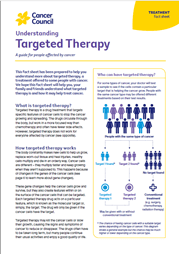- Home
- Ovarian cancer
- Treatment
- Targeted therapy
Targeted therapy for ovarian cancer
Targeted therapy drugs can target specific features of cancer cells to stop the cancer growing and spreading. These drugs are used to treat ovarian cancer that has come back or advanced ovarian cancer.
Learn more about:
- When will targeted therapy be offered?
- Types of targeted therapy drugs
- Side effects of targeted therapy
- Video: What is targeted therapy?
When will targeted therapy be offered?
Whether you are offered targeted therapy drugs will depend on:
- the type of ovarian cancer you have
- other treatments you’ve already had and if they’ve worked
- whether you have a particular gene change (fault) that may respond to targeted therapy drugs.
Types of targeted therapy drugs
Olaparib
This targeted therapy drug blocks poly (ADP-ribose) polymerase (PARP), a protein that targets cancer cells that have a BRCA1 or BRCA2 gene fault.
You may be offered olaparib after chemotherapy to treat a high-grade epithelial ovarian cancer. This is known as maintenance treatment.
Or you may have olaparib if the cancer has come back (recurred) after initial chemotherapy. Olaparib is taken as a tablet twice a day for as long as the drug appears to be helping control the cancer.
Bevacizumab
This targeted therapy drug is sometimes used to treat advanced epithelial tumours. It is given with chemotherapy every three weeks as a drip into a vein (intravenous infusion). Treatment will continue for 12 months for women first diagnosed with ovarian cancer, or for as long as it’s working if it is used for cancer that has come back.
Other targeted therapy drugs may be available on clinical trials. Talk with your doctor about what new drugs are available and whether you are a suitable candidate.
Side effects of targeted therapy
Although targeted therapy drugs limit damage to healthy cells, they can still have side effects. These vary for each person depending on the drug you are given and how your body responds. It is important to tell your doctor about any new or worsening side effects. If left untreated, some can become life-threatening. Your doctor will monitor you throughout your treatment.
The most common side effects of olaparib include nausea, fatigue, diarrhoea and low blood cell counts. More serious side effects include bone marrow or lung problems.
The most common side effects of bevacizumab include bleeding, skin rash, high blood pressure and kidney problems. In very rare cases, small tears (perforations) may develop in the bowel or stomach wall.
For more on this, see our general section on Targeted therapy.
Immunotherapy for ovarian cancer
Immunotherapy is a type of drug treatment that uses the body’s own immune system to fight cancer.
In Australia, immunotherapy drugs are currently available as treatment options for some types of cancer, such as melanoma and lung cancer.
At present, immunotherapy has not been proven to help treat ovarian cancer.
International clinical trials are continuing to test immunotherapy drugs for treating ovarian cancer. You can ask your treatment team for the latest updates.
For more on this, see our general section on Immunotherapy.
→ READ MORE: Radiation therapy for ovarian cancer
Video: What is targeted therapy?
If you have cancer, drug therapy may play a big role in your treatment plan. Watch this short video to learn more about drug therapies, including targeted and immunotherapy.
Podcast: Immunotherapy & Targeted Therapy
Listen now
More resources
Dr Nisha Jagasia, Gynaecological Oncologist, Mater Hospital Brisbane, QLD; Sue Hayes, Consumer; Bronwyn Jennings, Gynaecology Oncology Clinical Nurse Consultant, Mater Health, QLD; Dr Andrew Lee, Radiation Oncologist, Canberra Region Cancer Centre and Canberra Hospital, ACT; A/Prof Tarek Meniawy, Medical Oncologist, Sir Charles Gairdner Hospital, WA; Caitriona Nienaber, Cancer Council WA; Jane Power, Consumer; A/Prof Sam Saidi, Senior Staff Specialist, Gynaecological Oncology, Chris O’Brien Lifehouse, NSW.
View the Cancer Council NSW editorial policy.
View all publications or call 13 11 20 for free printed copies.
Need to talk?
Support services
Need legal and financial assistance?
Pro bono legal and financial matters, no interest loans or help with small business
Work and cancer
Information for employees, employers and workplaces dealing with cancer
Cancer information
Using targeted therapies
Information about drug therapies and immunotherapies
Where to find clinical trials
Links to information about current clinical trials of new therapies

